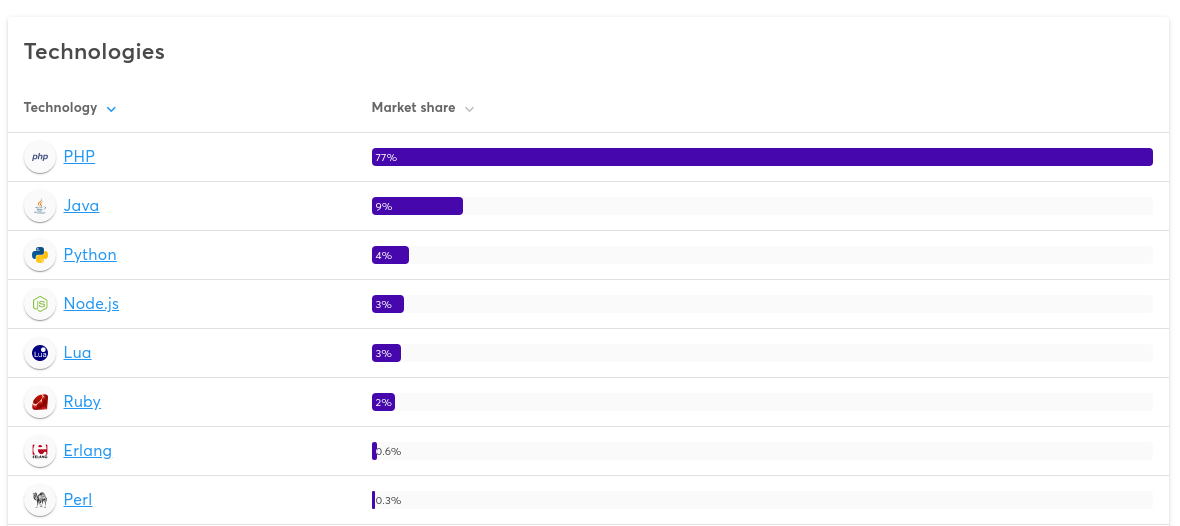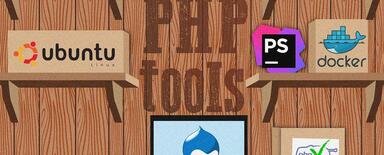
Why PHP Is Perfect for Startups
When building an internet startup, one of the important decisions a founder has to make is the technology to be used. This decision, once made, cannot be easily reversed. Typically, changing technologies later in the process requires a lot of costs and effort and slows a startup down a lot. Often the cost to do that would be so great that technology remains unchanged for years, if not forever. It makes sense do make the right choice early on.
Today I will explain why it really makes sense to use PHP.
PHP is by far the most common for the web
According to Wappalyzer, PHP powers 77% of websites - a great majority. Most of the websites you visit every day use PHP. This means that most of the development of the web happens in PHP.

Because PHP is so widely used, the risk that it will somehow become obsolete is very limited. It is a significant risk for a startup to choose a new niche technology that might not survive the competition. Having to maintain a framework abandoned by its creators and not used by anyone anymore requires a lot of effort and can be a real drag on your startups progress. With PHP you reduce this risk.
In PHP you can always find solutions which are built by thriving large communities and often backed by big companies, compared to some other more niche solutions where there is only a small company of a few devs behind them.
Also, if you chose PHP, you will be working in a vast and thriving ecosystem rather than a narrow niche. You will have:
- Access to a large pool of programmers who have experience in PHP. It will be easy to find an extension or replacement for your current PHP development team if for some reason you need additional team members.
- A plethora of pre-built solutions which can be re-used and save you time in development (more on that later).
PHP was built for the web
If your startup will offer a web application, then PHP is a natural choice. PHP was built for the web. From its creation PHP was there to assemble HTML websites to present them to the user. Since then it has gone a long way to become a modern, fast and mature language.
Still though most of the things people build in PHP revolve around the web. Every PHP programmer will have experience with building things working in the browser. Most OpenSource packages and frameworks available for PHP revolve around the web.
Many mature solutions are available in PHP for free
PHP, being around for so long, has developed an ecosystem of fantastic libraries and frameworks which help organise a project and deliver it quicker. Many of these are Open Source and free to use. Let’s look at some of the most popular ones.
Symfony
Symfony is the most notable PHP framework. It is considered to be the most modern and mature.
In fact, Symfony is so great and popular, that a large number of second-tier projects are using its components as their foundation. Among the most popular ones are:
- Drupal - a great enterprise-ready CMS used by large companies to build their websites
- Mautic - the most popular Open Source marketing automation system
- Magento ecommerce - uses Symfony components as well
- Sylius - another, very modern e-commerce solution
- Pimcore - a digital Experience platform
and many more.
There is a very large list of such projects on the Symfony website.
If you are serious about your startup, I would recommend considering Symfony or one of the projects built on Symfony.
Laravel
Laravel is based on Symfony and is a bit more opinionated. The advantage of using Laravel is increased simplicity and the ability to build even faster than in Symfony, though at the expense of a few architectural compromises that might have to be made.
As a rule of thumb, if your project is simple or you want to start and deliver the first MVP really fast, Laravel will be great. For more complex projects with some more architecture, Symfony might be a better choice.
Big web companies support PHP
You can look at this from 3 angles:
- Many companies built their products and solutions on PHP
- Many companies which use PHP for their own needs.
- Many very important companies which offer vastly used services offer easy ways to integrate via PHP SDK packages
The first 2 are important in that they ensure that PHP will continue to be relevant and invested in.
Typically, for an online startup, the last one is the most important because it will further cut your development costs. You will again be able to use already pre-built tools to integrate your project with various services. For example:
- Want to access Facebook Graph API - an official SDK in PHP will help you
- Want to collect payments, Braintree PHP SDK is waiting for you or Paypal SDK
- Want to interact with Shopify - https://github.com/phpclassic/php-shopify
- AWS - a vast library of examples
- Send emails - sendgrid SDK is here
Whatever service you look for, there will be a PHP SDK or a tutorial on how to integrate with PHP.
PHP as a backend for a Javascript frontend
These days, Javascript is getting more and more popular. Javascript allows for the creation of really slick UIs which work great on desktops and mobile devices. With the emergence of PWA standard Javascript allows for building fascinating frontend applications.
Each frontend application, however, needs a backend. Backend is needed for storing data (eg user accounts). If your application needs a very flexible frontend UI, choosing a Javascript framework might be the best choice. Still, though, I would recommend using PHP for the backend of the app because of all the reasons mentioned above.
I wrote an extensive blogpost about combining Drupal and React and also a more general one about a Headless approach to Drupal websites. They both explore the ways in which PHP and Javascript can work well together.
Summary
If you are considering which programming language to chose for your startup, PHP will be the right choice. It is free and offers many free frameworks and libraries. It is very common so access to developers is wide. It is also easy to integrate because many companies offer SDKs which already do the heavy lifting.
If you are still not certain whether PHP is the best choice, you can always contact us to consult. We are happy to help.










